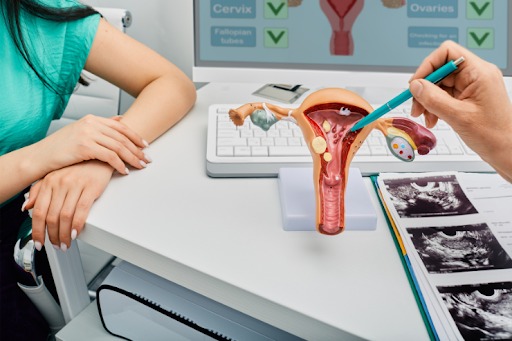What is Evaluation of Female Infertility?
It is a comprehensive diagnostic process designed to identify the underlying causes that may be preventing conception. This process involves various medical tests and assessments, including hormonal profiles, imaging, and specialized procedures to understand the reproductive system’s functioning.

Understanding Female Infertility
A. Definition and Causes
Female infertility refers to the inability to conceive after one year of regular unprotected intercourse. This condition can be attributed to various factors involving the reproductive system.Some of the common causes of include:
- Hormonal imbalances.
- Ovulatory disorders.
- Structural issues.
- Fallopian tube blockages.
- Uterine abnormalities.
- Age-related factors.
- Lifestyle factors.
B. Common Symptoms
- Irregular or absent menstrual cycles.
- Painful periods.
- Pelvic pain.
- Changes in cervical mucus.
- Difficulty conceiving.
Importance of Evaluation
A. Early detection benefits
Early detection of male infertility through comprehensive evaluation offers several important benefits:
- Improved treatment outcomes.
- Reduced time to pregnancy.
- Preventing complications.
B. Treatment planning
- Customized approach.
- Informed decisions.
- Optimizing success rates.
C. Psychological impact
- Emotional well-being.
- Support services.
- Patient empowerment.
Evaluation Process
- Clinical assessment: Review of medical history, physical examination, and discussion on lifestyle factors such as diet and stress levels that could impact fertility.
- Hormonal profile testing: Blood tests to assess levels of hormones, including estrogen, progesterone, follicle-stimulating hormone (FSH), and luteinizing hormone (LH). Understanding hormonal balance helps determine ovulation timing and ovarian reserve.
- Ultrasound imaging: Transvaginal ultrasound to evaluate ovarian reserve, follicular development, and uterine health. Pelvic ultrasound to check for structural abnormalities or conditions that may affect fertility.
- Hysterosalpingography (HSG): X-ray examination to visualize the uterus and fallopian tubes. Helps detect blockages, scars, or other structural issues that might hinder fertility.
- Endometrial biopsy: A biopsy to analyze the endometrial lining and assess hormonal responses. Insights into the timing and quality of the endometrium in relation to the menstrual cycle.
- Laparoscopy: A minimally invasive surgical procedure to inspect pelvic organs. Detects conditions such as endometriosis, fibroids, and adhesions that may impact fertility.
Interpretation of Results
Interpreting the results of these diagnostic tests is crucial. Our fertility specialists analyze each test’s findings to determine the underlying cause of infertility. Hormonal imbalances, structural abnormalities, and other factors are considered to devise a personalized treatment plan.
Treatment options for Female Infertility
Treatment options for female infertility can vary depending on the underlying cause and the overall health of the patient. The goal of treatment is to improve the chances of conception and childbirth. Here are some common treatment options:
Medications:
- Clomiphene Citrate: This medication stimulates the ovaries to produce more eggs, thereby increasing the chances of conception.
- Letrozole: Another medication that can help stimulate ovulation in women with irregular or absent ovulation.
- Metformin: Often prescribed to women with polycystic ovary syndrome (PCOS), Metformin helps regulate insulin levels and improve ovulation.
Assisted Reproductive Technologies (ART):
- In Vitro Fertilization (IVF): A procedure where eggs are harvested from the ovaries and fertilized with sperm outside the body. The fertilized eggs (embryos) are then implanted into the uterus.
- Intracytoplasmic Sperm Injection (ICSI): A specialized IVF technique where a single sperm is directly injected into an egg to facilitate fertilization.
- Gamete Intrafallopian Transfer (GIFT): A procedure where eggs and sperm are placed in the fallopian tube to allow natural fertilization.
- Zygote Intrafallopian Transfer (ZIFT): Similar to GIFT, but the eggs are fertilized in the lab before being transferred into the fallopian tube.
- Surgical Procedures:
- Laparoscopy: A minimally invasive surgery used to diagnose and treat conditions such as endometriosis, fibroids, and blocked fallopian tubes that may be contributing to infertility.
- Hysteroscopy: A procedure to remove uterine polyps, septa, or other structural abnormalities that can affect fertility.
Hormone therapy:
- For women with hormonal imbalances, hormone therapy can be prescribed to regulate menstrual cycles and ovulation.
Lifestyle modifications:
- Changes in diet, exercise, and stress management can have a positive impact on fertility. Weight management, quitting smoking, and reducing alcohol consumption can also improve reproductive health.
Assisted fertility devices:
- Intrauterine Insemination (IUI): A procedure where sperm is directly inserted into the uterus, increasing the likelihood of fertilization.
Alternative therapies:
- Some women explore acupuncture, herbal medicine, and other complementary therapies to manage stress and improve fertility outcomes.
Treatment options are tailored to the specific needs and conditions of each patient. A consultation with a fertility specialist at Shukan Hospital & IVF Centre can provide personalized guidance and help determine the most effective approach to address infertility concerns.
Why choose Shukan Hospital & IVF Centre in Ahmedabad for evaluation of female infertility?
- Our team of reproductive endocrinologists and fertility specialists has extensive experience in evaluating and treating female infertility.
- Equipped with state-of-the-art diagnostic tools to ensure accurate and efficient evaluation.
- We focus on providing individualized treatment plans to meet each patient’s unique needs.
FAqs
How long does the evaluation process for female infertility take?
The evaluation process can take a few hours to a few days, depending on the tests required.
What can I expect during the evaluation appointment for female infertility?
A comprehensive review of medical history, physical examination, and diagnostic tests to assess hormone levels, ovarian function, and structural issues.
Can female infertility be prevented?
While some factors, such as age and genetics, cannot be controlled, lifestyle modifications and early intervention can help manage and improve fertility outcomes.
What are the risk factors for female infertility?
Age, stress, lifestyle factors, medical conditions, and environmental exposures can all impact fertility.
At what age does female fertility decline?
Female fertility begins to decline significantly around the age of 30, with a more noticeable decrease in the mid-30s.
Can stress affect female fertility?
Yes, stress can impact hormone levels and menstrual cycles, potentially affecting fertility.
